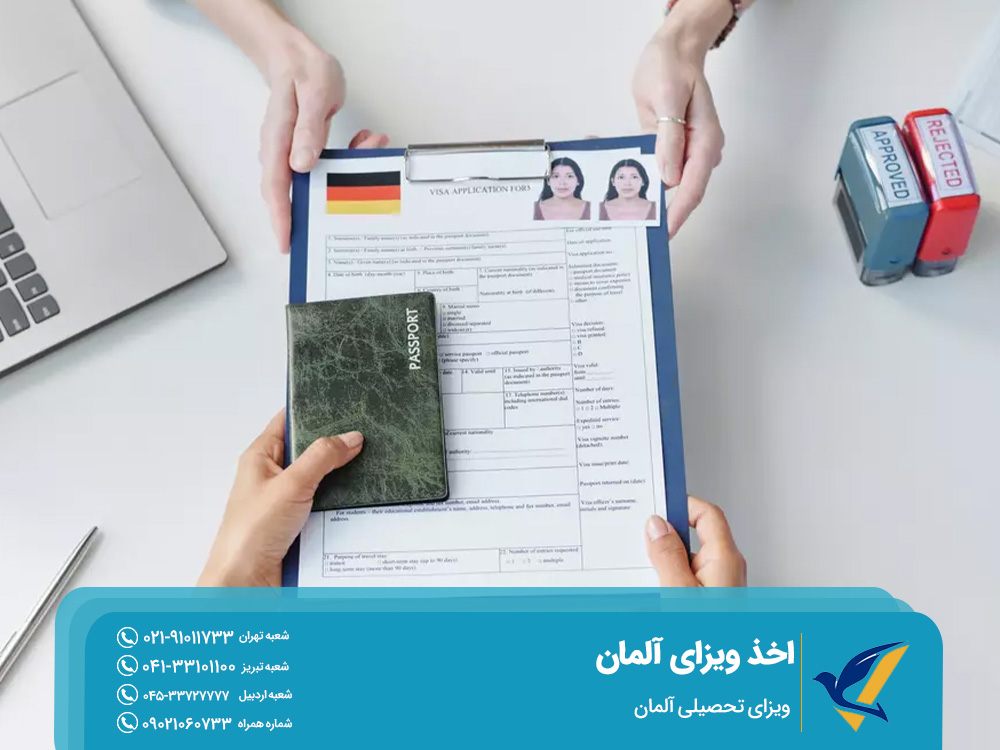As we know, Germany is one of the most advanced countries in the world, and obtaining a German visa provides excellent opportunities for the visa holder. With a German visa, not only does one gain the chance to live in an advanced country, but it also makes it easy to travel to 26 other European countries. The German visa is like a valuable diamond, offering great opportunities in education, career, and living conditions.
For this reason, many people strive to obtain a German visa to migrate to Germany. In this article, we will provide a comprehensive overview of the various types of German visas, so you can take the right steps based on your circumstances. Stay tuned for another article from the Elm Vira Immigration Institute.

Benefits of Immigration to Germany
The Federal Republic of Germany is one of the most advanced and wealthy European countries. After experiencing the hardships of two world wars, it has managed to position itself as a global leader in industry, technology, progress, and social welfare. Germany ranks ninth in the world for tourism, with millions of people traveling to the country each year by obtaining a German visa.
Natural attractions, historical landmarks, and advanced facilities are some of the main reasons that motivate many individuals to migrate to Germany for a better life. Opportunities to study at some of the best universities in the world, access to social and welfare services, the ability to work, and the low unemployment rate are key advantages of immigration to Germany. Applicants wishing to travel to Germany or obtain residency must familiarize themselves with the types of German visas and clearly define their purpose for going to the country.
Types of German Visas
Germany, along with 26 other European countries, is a member of the Schengen Agreement. Therefore, those who successfully obtain a German visa can easily travel to these countries. The German visa ranks third globally, and with this visa, one can travel to Schengen member countries as well as visit 170 other countries without requiring a visa. To obtain a German visa, it’s important to understand the different types of visas available. German visas are broadly divided into two main categories: national and long-term visas, and short-term visas. Given the costs of studying in Germany and the variety of visa options, studying in the country offers favorable conditions.
National and Long-Term German Visas
Individuals who intend to reside permanently in Germany can obtain one of the long-term German visas to secure permanent residency. To do so, the applicant must first clearly define their purpose for obtaining a German visa. The types of long-term German visas include:

- German Student Visa
One of the types of German visas is the student visa. International students who wish to study at the top universities in Germany must apply for a German student visa. Obtaining this type of visa can be challenging, as the German government has strict regulations and requirements in place. There are two ways to obtain a German student visa: either the university sends an invitation to the applicant, or the applicant submits an admission request to the desired university.
- German Work Visa
Germany offers numerous job opportunities, and the country is currently facing a shortage of skilled workers. The unemployment rate in Germany is one of the lowest in the world. As a result, many individuals apply for a German work visa to secure employment in the country. The German work visa is divided into four categories:
- Nursing Visa
- Job Offer Visa
- Ausbildung Visa (Vocational Training)
- Job Seeker Visa
The duration of the German work visa is six months. Key requirements for obtaining a work visa include holding at least a bachelor’s degree, having a minimum of two years of relevant work experience, and proficiency in either German or English. With a German work visa and four years of employment in the country, individuals can apply for permanent residency and enjoy other immigration benefits, such as receiving the Blue Card in Germany if their monthly income exceeds €3,000.
- German Dependent Visa
Individuals who have received a German visa and residency often wish to bring their spouse and children to join them. In this case, they must apply for a German dependent visa or family reunification visa for each family member. One of the conditions for obtaining a dependent visa for children is that the child must be under the age of 18 and unmarried.

Obtaining a German Visa: Short-Term Visas
Another category of German visas is short-term visas. If an individual plans to stay in Germany for a short period, up to 90 days, they must apply for a short-term German visa. The types of short-term visas include:
- German Tourist Visa
- German Airport Transit Visa
- German Exhibition Visa
- Cultural Program Visa
- Truck Driver Transit Visa
- German Business Visa
Another type of German visa is the business visa. Germany has the fourth-largest economy in the world, which creates numerous job, investment, and business opportunities. As a result, many business owners and entrepreneurs travel to Germany for trade and investment. Citizens from 62 countries can easily trade with Germany without needing a business visa, but Iranian traders must obtain a business visa to engage in trade with German companies. The specific documents required for a German business visa include:
- Official invitation letter from the German business partner (in German or English)
- Six-month financial turnover statement of the business
- Certification from the business director authorizing employee travel
- Copy and original articles of incorporation of the business
- Detailed business meeting minutes (for stays longer than 30 days in Germany)
Medical Visa
The medical visa is another type of short-term German visa. This visa is valid for three months. To obtain this visa, the applicant must submit all the necessary documents, medical records, and a recommendation letter from their treating physician to the German embassy. Additionally, a letter of acceptance from the German hospital where the patient will be treated must also be presented. Proof of financial means to cover the cost of stay and treatment is also required. If treatment extends beyond three months, a Schengen visa application should be made.
Family Visit Visa
If your family members are legally residing in Germany, you can apply for one of the German visa types to visit them. This visa is issued for non-German family members who reside outside the European Union. With this visa, you can stay in Germany temporarily or permanently.

Steps to Apply for a German Visa
To obtain any type of German visa and migrate to Germany, you must first identify the visa type and prepare the required general and specific documents for that particular visa. The steps involved in applying for a German visa are as follows:
- Prepare and Review Required Documents for the Visa
- Schedule an Appointment with the German Embassy
- Submit the Required Documents to the Embassy for Visa Application
- Documents Required for Applying for a German Visa
Each type of German visa has specific documents needed, depending on the visa category. However, there are also common documents required for all types of visas, including:
- Completed visa application form
- Officially translated identification and personal documents
- Original passport with the required validity
- Passport-sized photo in the specified format
- Travel itinerary (educational, tourist, business, work, etc.)
- Proof of accommodation in Germany
- Proof of financial means
- Proof of visa fee payment
Visa Fees for Germany
The fee for issuing a German visa depends on the applicant’s age and the type of visa requested. The following are the visa fees based on age:
- Visa fee for individuals under 6 years old: Free
- Visa fee for individuals aged 6-12 years: 40 EUR
- Visa fee for individuals over 12 years old: 80 EUR
In addition, the visa fee may vary based on the visa type and the applicant’s length of stay in Germany.
Visa Type / Duration of StayVisa Fee
German Work Visa 80 EUR
Stay longer than 3 months (Long-term) 75 EUR
Stay less than 3 months (Short-term) 60 EUR

Age Requirements for Immigration to Germany
The age requirements for immigration to Germany and obtaining a visa depend on the type of visa. For example, individuals applying for a German work visa must be between 18 and 67 years old, as the retirement age in Germany is 67. It is noteworthy that individuals aged 18 to 35 have a higher chance of obtaining a visa. For Ph.D. studies, the maximum age is 40. Applicants for medical studies in Germany should be under 23 years of age. For other visa types such as tourist, business, and exhibition visas, there are no age restrictions.
Conclusion
Germany is one of the most advanced countries in Europe and the world, offering great job, educational, and welfare opportunities. Therefore, many individuals are interested in obtaining a German visa. To apply for a visa, the first step is to determine the type of visa. The type of visa depends on the applicant’s purpose and conditions for immigration. German visas are divided into long-term and short-term categories. Long-term visas include student, work, and family reunion visas, while short-term visas include tourist, medical, business, exhibition, and transit visas.
To obtain a German visa, the necessary documents must be prepared and submitted to the German Embassy. The required documents include general and specific documents related to the requested visa type. Elm Vira Immigration Institute, with a successful track record and numerous immigration cases, strives to provide the most comprehensive and up-to-date immigration, educational, visa, and investment information for applicants. You can contact our experts by completing the free consultation form.
میانگین امتیازات 5 از 5
Vote count: 1 Vote